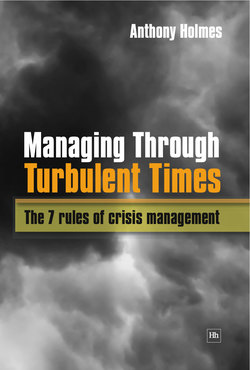Читать книгу Managing Through Turbulent Times - Anthony Holmes - Страница 13
На сайте Литреса книга снята с продажи.
Avoiding panic moves
ОглавлениеIndividuals are programmed to believe that inaction in the face of clear and present danger is not the most appropriate conduct.
If a car is driving towards you then to hold your ground seems to be a stupid decision likely to result in you being injured. But jumping off a high bridge in panic to avoid the car is equally irrational.
The virtuous act of facing down the threat has absolutely no effect, nor does pretending that it is irrelevant. Turbulent times are insensitive to the reputation, stature or posturing of the manager.
Managers should not deny or ignore the emergence of turbulent times or minimise the risks to their organisation but nor should they believe that, having concluded that a dangerous storm is developing, they must be seen to be doing something even though it is a poorly considered action.
Doing something because you must oppose the onslaught and this is the only action you can envisage that may have any effect is insufficient.
Ill-considered action may result in irreparable damage in the same way that sailing a boat badly in a storm can be disastrous. Running with the sea is, in some conditions, just as destabilising as running against it. If going sideways is just as bad or not an option what action do you as the manager/helmsman take?
Most experienced sailors will say that if you are in turbulent water that is unfamiliar to you, then you must learn to read the sea and try to position the boat differently in anticipation of the next wave. All waves are not the same and each must be dealt with on its merits. Adaptability is the necessary attribute. Take a series of small decisions until you can make a strategic move with confidence.
